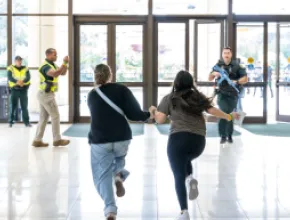Sometimes, a contingency plan that’s in place for one type of incident can be applied to another situation with great success.
Such was the case for Gaylord Opryland Resort in the spring of 2010, when a massive rainfall hit Nashville and the surrounding area, bringing in about 17 inches of water and dramatically straining a nearby levy that normally keeps the Cumberland River at bay.
“We do a variety of safety training, year-round, because we get a lot of tornadic activity,” says Peter Weien, senior vice president and general manager of the property. “So we knew what to do in a weather emergency.”
The first steps were communication and assessment.
“We were in constant contact with engineers, the Nashville Weather Service, and others,” Weien says.
On the second day of the storm, property officials decided to evacuate guests and stop accepting reservations. The move meant Opryland had to cancel a meeting that was coming in the next day, for which some attendees were already on-site. Once a decision was made, execution was key.
“We started getting guests moved into one of our ballrooms and then transporting them and their belongings to a local high school,” Weien says. “We canceled the event that was coming in and worked with the meeting planner to reach out to attendees.”
In addition, he says, Gaylord’s sales team used the offices of the hotel’s national sales teams to call all clients who had meetings coming in for the remainder of the year, asking for a two-week grace period for the hotel to determine the best course of action for future events.
Ultimately, hotel officials decided they would try to get hotel open by Nov. 15, and they moved groups that were on the books with programs before that date.
Property officials would have been hamstrung without practice and a plan, according to Weien.
“We knew how to communicate with guests, and to get our people to other offices, because we followed our template,” he says.
Still, nothing is perfect. Weien wouldn’t identify any errors made by staff during the storm, but he and his team did gain some “learnings” from the experience, he admits.
“Now we know to have bullhorns on-site in case we lose communication; and we’ll make sure we know ahead of time where to stage our generators,” Weien says. “We added these to our plan.”






